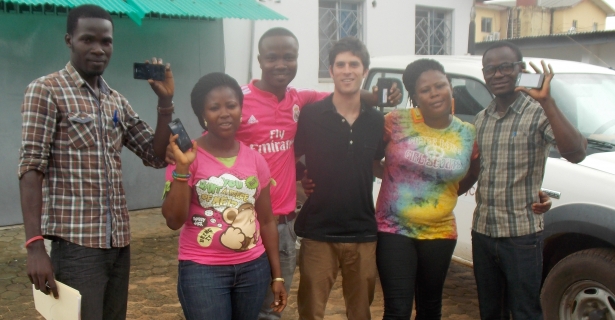Eric Jospe is a candidate for the Master’s of Law and Diplomacy (MALD) at the Fletcher School and an Empower Fellow.
Greetings from Monrovia, Liberia! My name is Eric Jospe and I am a rising second year Master of Arts in Law and Diplomacy candidate at the Fletcher School, studying development economics and human security. Thanks to funding provided by Empower, I am currently doing my summer internship at Mercy Corps Liberia, where I am conducting market research for a social enterprise that aims to help young people access the information they need to find a job, start a business, or develop their skills.
The challenges Liberia faces are almost too many to name. Scars of the 14-year civil war that ended in 2003 can still be seen every day, in the one-legged victims who hobble around on crutches, the destroyed buildings that have yet to be rebuilt, and the poor infrastructure everywhere but for a few blocks of the capital. Deeper problems exist within Liberians themselves. Having grown up during the war, a generation of Liberian youth missed out on a proper education. Almost 40 per cent of Liberians over 15 years old have never attended school. Many participated in the war as child soldiers, resulting in displacement, trauma and an inability to resolve problems without resorting to violence. Thankfully, large-scale conflict is no longer an issue, at least for the time being, thanks to the disarmament, demobilization, and reintegration (DDR) process after the war and the United Nations Mission in Liberia (UNMIL) peacekeeping force that has remained in the country since then. However, significant barriers, both individual and structural, are keeping the country from transitioning to long-term development.
One of these barriers is youth unemployment. All over the country, young people are out of work. Only 17.2% of Liberians are engaged in formal employment, and that number decreases when looking at the youth population alone. The idleness of young people, combined with the high poverty rate, is a recipe for disaster. Based on my meetings with government ministries, civil society organizations, and youth themselves, many frustrated young people would be willing to resort to violence if someone paid them to do so. Some observers believe that the conditions for civil war remain in place, and fear that when UNMIL eventually packs its bags, there could be a resumption of violence.
It is into this environment that I find myself for my summer internship, contributing to the design of a social enterprise that responds to this challenge. The idea of the business is that there is currently no centralized place for businesses to post job availabilities or job seekers to post resumes at the lower end of the market. Jobs are advertised in newspapers, on the radio, and on bulletin boards, but that information doesn’t reach everyone. Some people pay relative fortunes on transportation costs going from business to business to inquire about and apply for jobs. Some businesses don’t hire at all because they don’t think they can find the right employees. So we’re hoping to deliver that information directly to people’s phones, helping businesses find the right employees and people find jobs.
Through focus groups, surveys, key-informant interviews and ethnographic research with job-seeking youth, entrepreneurs, and employers, I am attempting to answer several foundational questions that will help inform the design of Mercy Corps’ social enterprise:
• Who are our potential customers?
• What are the challenges that youth face in finding jobs or starting businesses?
• What are the challenges that businesses face in recruiting qualified employees?
• To what extent do existing services satisfy the needs of customers?
• What could a business do to respond to these gaps?
It has been a fascinating experience so far. Being able to interact directly with youth and businesspeople from different communities in Liberia has given me a glimpse of the destructive effects of war, as well as how a people can lift itself back up and rebuild. In my next blog post, I hope to share some of the findings from my research, the challenges ahead, and how this experience has shaped my own education and career ambitions.


Add new comment